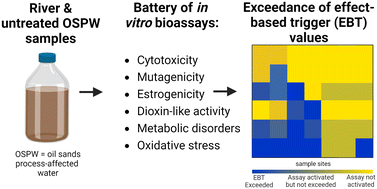Water quality monitoring with in vitro bioassays to compare untreated oil sands process-affected water with unimpacted rivers†
Abstract
The Alberta oil sands are among the largest oil reserves in the world and generate acutely toxic oil sands process-affected water (OSPW) that is currently stored in tailings ponds. One of the future tailings management strategies considered by mining companies is to treat and release OSPW into the Lower Athabasca River (LAR), but the potential future impacts on the receiving aquatic environments are not completely understood. This study employs a battery of in vitro bioassays (cytotoxicity, estrogenicity, mutagenicity, oxidative stress response, and xenobiotic metabolism) to assess the (eco)toxicological effects of the mixtures of organics extracted from surface water samples at 15 sites along the LAR under high- and low-flow conditions. We also assessed the biological activity of untreated OSPW and the effluents from two municipal wastewater treatment plants (WWTPs) for comparison. Overall, the LAR samples showed little to no bioactivity responses, suggesting a low risk to the aquatic environment prior to potential OSPW discharge. Although treated OSPW was not considered in this study, the high responses observed for untreated OSPW suggest that the use of selected in vitro bioassay endpoints can be extended to assess the efficacy of treatment technologies that may be implemented for OSPW in the future. Treated municipal WWTP effluent extracts also activated the bioassays. However, in comparison to the proposed effect-based trigger (EBT) values for in vitro bioassays (after dilution is considered), the potential toxicity risks associated with direct exposure to these effluents are reduced due to the relatively low contribution to the river flow (0.01–0.04%).



 Please wait while we load your content...
Please wait while we load your content...